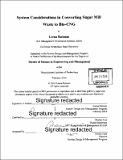| dc.contributor.advisor | Charles Fine. | en_US |
| dc.contributor.author | Ratnam, Leena | en_US |
| dc.contributor.other | System Design and Management Program. | en_US |
| dc.date.accessioned | 2016-11-14T19:05:48Z | |
| dc.date.available | 2016-11-14T19:05:48Z | |
| dc.date.copyright | 2014 | en_US |
| dc.date.issued | 2014 | en_US |
| dc.identifier.uri | http://hdl.handle.net/1721.1/105301 | |
| dc.description | Thesis: S.M. in Engineering and Management, Massachusetts Institute of Technology, Engineering Systems Division, 2014. | en_US |
| dc.description | Cataloged from PDF version of thesis. Page 73 blank. | en_US |
| dc.description | Includes bibliographical references (page 72). | en_US |
| dc.description.abstract | Sugar mills produce a range of by-products during the sugar extraction process. Bagasse, press-mud (also known as filter cake or mill mud), molasses and alcohol by-products are commonly used for various purposes. Specifically, press-mud, one of the by-products is produced in significant volume. Some of this press-mud is utilized by farmers as fertilizer. However, the supply of press-mud often exceeds the demand leading to stockpiling onsite or spreading it over nearby cane fields as a disposal method. Subsequently, the heavy metal contamination and over-fertilization of cane fields and spillage to nearby waterways due to excess press-mud has raised serious environmental concerns. This study takes a look at a possible method to mitigate air, water and health pollution from sugar manufacturing in India by converting the excess press-mud generated into Biofuel. This operation not only mitigates pollution, but also opens up an income stream for small to large scale sugar mill enterprises in a nascent but promising market in India. Systems thinking methods that we use in this study to examine the Biofuel solution to excess press-mud generation show several benefits to local community, local sugar mill facility owners as well as external constituents. These benefits include higher quality of living through a cleaner environment, enhanced employment opportunities and local access to fuel, which in turn lowers dependence on costly energy imports. | en_US |
| dc.description.statementofresponsibility | by Leena Ratnam. | en_US |
| dc.format.extent | 73 pages | en_US |
| dc.language.iso | eng | en_US |
| dc.publisher | Massachusetts Institute of Technology | en_US |
| dc.rights | M.I.T. theses are protected by copyright. They may be viewed from this source for any purpose, but reproduction or distribution in any format is prohibited without written permission. See provided URL for inquiries about permission. | en_US |
| dc.rights.uri | http://dspace.mit.edu/handle/1721.1/7582 | en_US |
| dc.subject | Engineering Systems Division. | en_US |
| dc.subject | System Design and Management Program. | en_US |
| dc.title | System considerations in converting sugar mill waste to Bio-CNG | en_US |
| dc.type | Thesis | en_US |
| dc.description.degree | S.M. in Engineering and Management | en_US |
| dc.contributor.department | System Design and Management Program. | en_US |
| dc.contributor.department | Massachusetts Institute of Technology. Engineering Systems Division | |
| dc.identifier.oclc | 962306668 | en_US |
